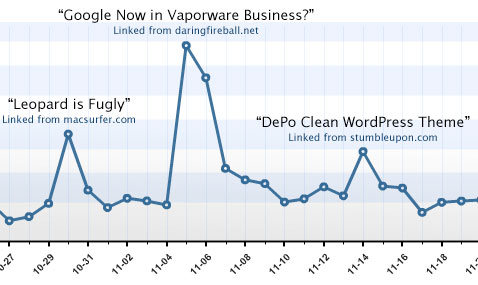If It Bleeds, It Leads
With my month-long experiment in daily posting a week away from its blissful conclusion, I thought I’d check to see what effect, if any, it was having on the site’s traffic. So I checked in with the handy WordPress traffic page. Here’s what I saw, with the addition of the most trafficked posts and the biggest referrer.

The first spike is when I complained about the design of Apple’s new OS (Leopard is Fugly) and a bunch of Mac sites picked it up. The second is when I went off half-cocked on Google (Google Now in Vaporware Business?) and Daring Fireball linked in. And the third was when, totally randomly, my WordPress theme (DePo Clean WordPress Theme) got a surge of traffic from StumbleUpon.
Meanwhile I posted a 4-part story of travel madness, a political rant, advice from my years as a web designer and photographer and writer, and a huge treatise on academia and the internet.
On the face of it, this seems to prove that half-cocked punditry trumps personal storytelling and helpful essays, at least where traffic magnetism is concerned. Perhaps the smart reaction to this is to just spurn traffic data altogether. After all, one can’t decide what to write about based on glances from total strangers. But it’s hard to totally ignore that input.
I think the truth is, it’s just random. Tracking hits is like watching a butterfly and trying to explain chaos theory. First you have to write something on a timely topic, and you have to write it well. Then other people have to read it, like it, and link it, leading more people to repeat the process. All of which depends on so many separate people taking individual action, it’s difficult to imagine any way to have done it all on purpose. (And a little ignoble, to boot.)
Of course, all of this has been a part of journalism for years, which is why we have things like the inverted pyramid, editorial structure, and sayings like “if it bleeds, it leads.” Editors specialize in the messy process of deciding what news is.
One of the gifts blogging and the internet gives us, though, is the ability to leave all that behind. Blogs can develop their own audiences, standards, and priorities. And yet, here we are, obsessing over our stats, watching that butterfly flap its wings.
